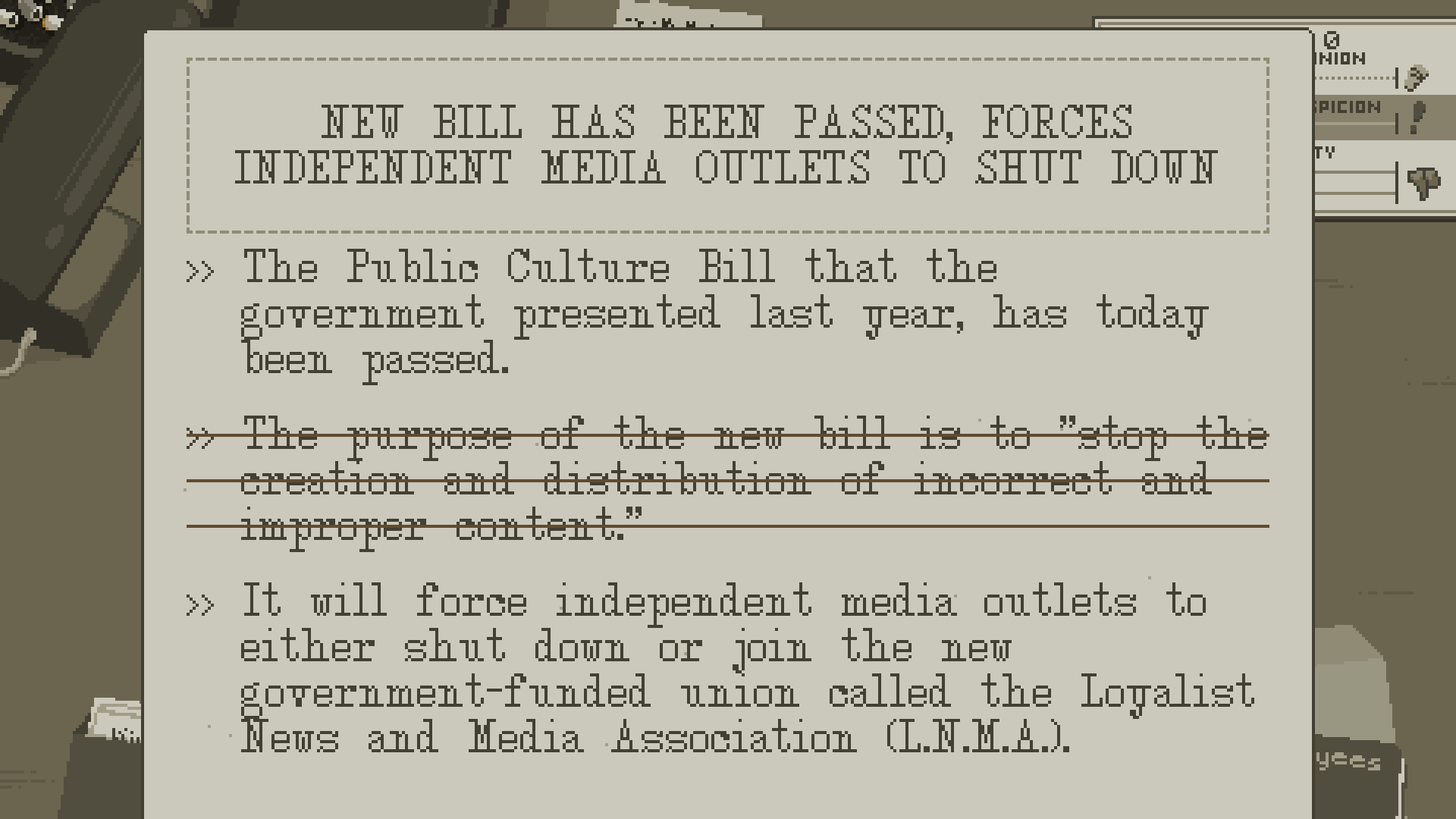
Featured Blog | This community-written post highlights the best of what the game industry has to offer. Read more like it on the Game Developer Blogs or learn how to Submit Your Own Blog Post
Subtext and the importance of feedback
When using subtext in games, how do you as a creator make sure that your players understand the underlying themes? This article explores the difficulties with subtext in interactive stories, and how to overcome them.

When creating a story about intrigue, mystery and secrets, one of the most important aspects is subtext. It's what keeps the player on the edge through every bit of dialogue, detail and interaction. It's what makes us analyse characters, their behaviour and their relationships.
One of the biggest advantages that non-interactive media has regarding subtext, is that the person experiencing the story doesn't need to understand the subtext in order for the story to progress. Examples for this would be Fight Club or The Sixth Sense, where the subtext goes unexplained until the very end of the story (Which in turn makes the second viewing quite different from the first one).
While games can still use subtext in similar way by utilizing plot twists to make the subtexts appear more clearly upon a second viewing, if we truly want the player to be a part of a subtext-heavy story, her/his actions should be reliant on that subtext. For an example, in a detective game, the game shouldn't outright tell the player that "A hates B because C is in love with B instead of A". Rather, the player herself/himself should have to figure out the underlying intrigues going on in order to solve the crime. The subtexts should be a part of the puzzle.
As I wrote earlier, games don't need to use subtext in this way in order to be a good game. Subtext can be used in numerous ways. But if you want subtext to be an interactive element in your game, the player should have to figure out these things herself/himself.
So why is this hard to do in games? Well, it's because subtext is based a lot on understanding the layers of a story. If seeing through the layers is too easy, the subtext feels forced or at worst, barely like subtext at all. If it's too hard, no one will understand what you're really trying to say and all you'll end up with is a confused player who doesn't know what to do.
At this point in the text, it's probably good to briefly tell you about the game we're developing, and how it relates to this subject.
We're developing a game called The Westport Independent, a censorship simulator about an independent newspaper trying to survive in a totalitarian state on the brink of revolution. In the game, you affect the people’s opinion of both the rebels and the state by removing and editing the contents of your articles. With an increase in rebel activity and an ever watching government breathing down your neck, it's up to you to decide whose truth to print.
The dilemma we soon ran in to when starting to write the game was how we should write the articles. We needed to make sure that the players would understand how the people (of the game) would react without saying anything outright.
For an example, if the rebels bombed a building in the middle of the city, would the rebels get more support, as they show their strength, or would people view them as terrorists and therefore distance themselves? Well, in that case it's actually a multi-layered question:
First, the government would be unhappy with the fact that you wrote about a bombing taking place in the country.
Second, when bombings, vandalism or similar acts occur, the rebels gain support, as the government's inability to stop them would portray said government in a poor light amongst the public.
Third, if the rebels are blamed for the bombing the people will distance themselves from the rebels and support the government more. This is because rather than being angry with the government for their inability to protect its citizens, when there's a "villain" involved, the government will gain more support to stop said "villain".
Fourth, blaming it on the rebels would make the government a little less angry that you wrote about a bombing. However, the government wouldn't be angry at all if devastating events like these weren't spread to the public to begin with.
To explain it other terms, if you'd only say that a bombing took place, the government would be very angry at you, and the public would get angry at the government and the rebels would gain more support. If you'd instead blame the bombing on the rebels, the rebels would lose support causing the government to gain more supporters, which in turn would make sure that the government wouldn't be AS angry with you as in the first option. However, if you'd just cover up events like these and let the government clean up the rebels without the public ever hearing about it, the government wouldn't take offense at all, and might just even start to take a liking to you.

A different example of an article. Here, the player has to understand that a study perfromed by the government will probably be biased. Keeping it in will make the government angry and give the rebels a bit more support. Keeping it out will make the study seem more objective, making the claims much more believable, which in this case will make the government happy (and also give them more support).
All this just might seem a bit complex, but understanding the subtext is one of the main points of the game. It's all about how you manipulate each story to benefit your agenda.
So how did we make sure that the players understood the subtext while still making it a part of the "puzzle"? We gave the player feedback. We've done our best to make sure just about everything in the game reacts to the players actions. By doing this, we let players who don't catch the subtext immediately get a reaction from the game that will make the subtext more understandable.
Types of feedback
I'm going to walk you through the various ways we've used to give the player feedback, while trying to avoid shoving the sub textual meaning down the players' throats. I'll try to divide these into different categories to make things a bit easier to read.
Also, while I've been working with games for a while now, I don't have an academic degree in game design or anything, so the way I categorize these types of feedback might be different from what other people have heard. This is how we define them when we work on The Westport Independent, and might not work as well on other projects.
Stats-based feedback / Mechanics-based feedback
Stats-based feedback is what we call feedback that are pretty much point based. A decently basic example of this would be getting bad/good karma in Infamous or renegade/paragon in the Mass Effect-games. You pretty much make a narrative choice, and the game responds to that choice by giving stats that reflect your "goodness" as a character.
A slightly more advanced version of this would be GTA 2. In this game, you can do missions that will gain you trust with one gang, but will also make you lose trust with the other gangs. You can also at any point attack a gang to increase your trust with their opposing gang. This allows the player to change alliances whenever she/he wants to, as all stats can go up or down during the game depending on the player's actions.
For The Westport Independent, this was one of the first things we added. After every week, the player receives stats telling him/her how the public's opinion was affected. The player is also told how suspicious the government is of her/his paper, a stat which also changes each week. By reading these stats, the player can tell if the game gave the results the player expected. If it didn't, they see that there's probably some subtext that they've missed.
Of course, the issue with this sort of feedback is that you see it retroactively, meaning that you'll only find out if you understand the subtext when it's already too late to change it. This is something which can be seen plenty of dialogue-based RPGs, where you choose one dialogue and the character proceeds to say it in a way that's different from what you meant. In our game we solve this somewhat by making it so each week has a relatively small effect, especially in the beginning, allowing people to learn from their mistakes rather than screwing up the entire play through just because you were unfamiliar with the subtext.
All in all, stats-based feedback is a foundation for many choice-driven games. It should by no means be your only source of feedback if you want to make the world seem vibrant, but it's a basic feature that can be used to expand features in other areas.
Narrative feedback
Narrative feedback is feedback that's not given through numbers, but rather through the game's story. When making sure that a player has understood the subtext of the game, this is the preferred way to go, as it allows you to expand upon the world in various ways while also explaining what the player did wrong. One example of this (which I'll talk more about later) used in The Westport Independent is when the government sends you threat mail when you've published the "wrong" content. This lets us expand on why the government was displeased, while also characterizing the government in a way that would not have been possible with just stats.
You'll probably also notice throughout this part of the article that how you give your narrative feedback is strongly connected to how you let your players affect the games storyline. As there are tons and tons of ways to do this, I'll narrow it down to two methods: Narrative feedback based on stats and Narrative feedback based on specific branching points.
Narrative feedback based on stats
Narrative feedback based on stats is what happens when the story of a game changes depending on the stats the player has gain throughout her/his play through. I'll use Mass Effect's renegade/paragon-system here again. For those of you who haven't played it, it uses a system where some choices in the game will give you either "renegade" or "paragon" points (basically "evil" and "good" points). Depending on what stats your character have, you'll unlock new dialogue choices that you can explore, and thereby affecting the narrative. Mass Effect also likes to show the player choices that haven't been unlocked by the stats, which I'd argue makes the subtext of being paragon or renegade even less subtle than it already is.
In The Westport Independent, the articles that the player receives are randomized each play through. These articles are picked from a pool of articles, which changes depending on the players stats. So if the player chooses to make the city more rebellious, the pool of articles will contain more articles about bombings, vandalism and riots. If the player instead supports the government, the pool will contain more articles about police brutality, new laws and general stuff about the president.
The advantage with giving narrative feedback through the help of stats is that it doesn't use a single choice to decide the outcome of a story. The problem is that you won't be able to call back to choices earlier by just using these types of stats, as the game won't be sure what specific choices gave those points in the first place. This means that the narrative feedback has to be quite general, rather than going more in depth when commenting on the players actions.
Narrative feedback based on branching paths
Branching paths is something that most people think about when talking about videogames where the story can be affected by the player. In this article, I'm going to define this as narrative feedback that is triggered on a specific branching point, for example if you answer "yes" or "no" during a specific dialogue. Once again, this is something that Mass Effect uses as well, where some branching points will give the player different results depending on what he/she chooses. A game that does this very heavily is The Witcher 2, where there's choices that will let you experience a completely different part of the game depending on what you choose.
In The Westport Independent, we use so-called follow-up articles. These follow-up articles are articles that are continuations of earlier stories, and branches depending on what the player wrote in the root article. For an example, take the article I talked about earlier. That article could potentially have two follow-up articles:
If you say the bombing is due to the governments incompetence and inability to stop events such as these, you'd receive an article about how there were protests outside a government building, asking the president to take responsibility.
If you say the bombing was caused by terrorist rebels, the government would be able to pass a new bill that'd give the police more authority and allow them to charge alleged rebels on suspicion alone.
We also use the employees in the game in a similar manner. Between each week, the player will see a small scene where the employees discuss the past week. One of the key subjects in these discussions are usually the player's actions that week, and is based mostly on what content he/she published. These small breaks are a bit different from the articles, as they provide a more personal point of view to the various events taking place in Westport, giving the player context to how it is living in certain districts and being of a certain social class. This does of course also help the player to further understand the subtext of the game's story.
Added to this, there are also letters in the game. If the player writes something really offensive towards either the government or the rebels, they will receive a letter from the faction in question, often containing threats of one kind or another. Letters are sent by other characters as well, like when an employee is uncomfortable with governmental propaganda being put up in the office, or the agent of a renowned movie star tells you that you've made a small factual error regarding the celebrity's last marriage. Basically, it's yet another way for us to give the player context to the game's reactions, and why doing something led to this consequence.
Doing both
If possible in your game, then using both these methods is probably preferable. This is yet again something that Mass Effect does, where unlocking certain dialogue choices by having certain renegade/paragon stats will give you the ability to choose a different branch at a branching point in the story.
In The Westport Independent, we use a similar way by using stats to decide if a branch will be used. For an example, you may write an article in a certain way which will give you a certain follow-up article. This follow-up article may look a bit different depending on how rebellious the peoples' opinion is. Same thing goes for letters; If you write an article about something that'd upset the government, you might receive a less angry letter if your stats say that you've supported them previously.
Closing words
Of course, giving feedback is only one way to show the player if she/he understood the subtext. It won't make the subtext easier to understand on its own. Good writing is still required, and writing an interesting narrative with a heavy emphasis on subtext is not always easy.
And that's all I had to say about it. It became quite a lot longer than planned, as I quickly realized that this subject was more expansive than I first expected. Despite its length, I hope that this text might help some of you with making sure that your players understand the subtext used in your game!
Read more about:
Featured BlogsAbout the Author(s)
You May Also Like







.jpeg?width=700&auto=webp&quality=80&disable=upscale)








